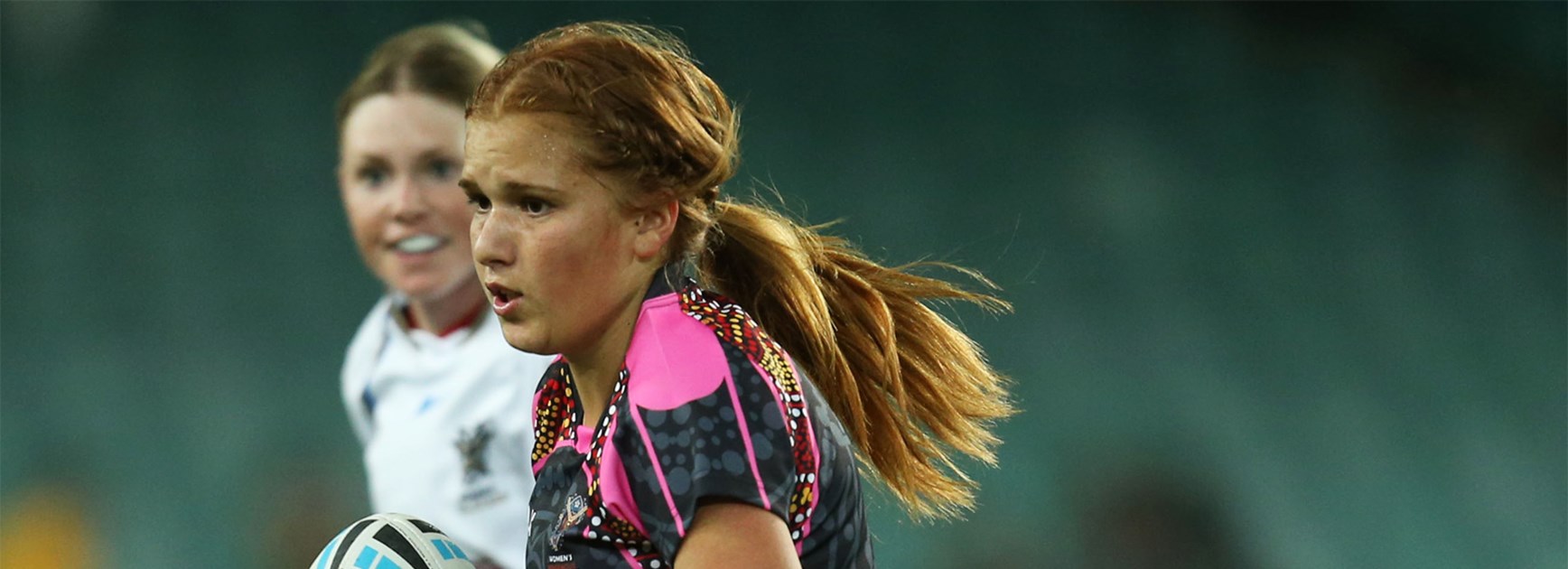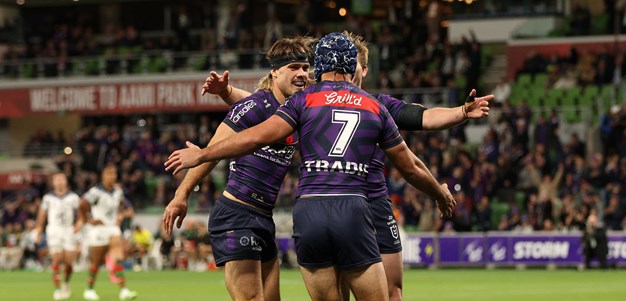
The Indigenous All Stars fixture has been rightly acclaimed as a chance to celebrate the rich Indigenous culture intertwined with rugby league but it has another, massive benefit in the women's fixture as a critical development pathway for players who don't get regular exposure to top-level games.
While both men's teams are drawn from players in the NRL system who are almost always top-level regulars, the women's Indigenous squads coached by Dean Widders draw players from competitions like the Murri Carnival and Koori Cup knockout for whom it serves as a gateway to higher honours, potentially with the Jillaroos.
One obvious example is centre Caitlyn Moran, who was part of the recent winning Jillaroos Auckland Nines team and made her Test debut against the Kiwi Ferns in last year's May Test after originally pressing her claims via the annual All Stars fixture.
The 21-year-old Novocastrian is suiting up for her fourth appearance for the women's Indigenous team and said she may not have got to the Jillaroos when she did if not for the All Stars.
"It's pretty much a platform for where I got picked really because I had a rugby union background," Moran told NRL.com.
"Every year we'd play the knockouts then get branched over for All Stars… it's where I started.
"When I got the call-up it was the only game they (the selectors) would see me play because I wasn't playing any rugby league in a Sydney metro comp or anything like that so the only game they would have seen me play is the All Stars week.
"With all the younger girls coming through there's definitely a pathway for that."
Jillaroos legend Katrina Fanning is the current team manager of the Indigenous women's team and was the first Aboriginal Jillaroos player; she is delighted to see the progression of the fixture and the opportunities it provides.
"The women don't have a structured elite competition so for Indigenous women this is a pathway from community football right through to the Jillaroos," Fanning said.
"We've had girls who've only played one season come through the knockout carnivals and ended up in a Test jumper that year so it's been great to branch out into communities as far north as the Torres Strait and Darwin.
"It truly is a team that covers the breadth of rugby league heartland, not just our metro areas. It is great to see the opportunity it gives not just these girls but the difference it makes back in their communities as well."
Skipper Bec Young, who has six of the past seven Indigenous All Stars fixtures, has also been a long-term fixture in Jillaroos squads and describes the week as "more than just a game.
"There's a bit of a carrot dangling for a lot of us in regards to that higher level, Jillaroos opportunities, so there's lots of competition for that in regards to the game," Young told NRL.com.
"We've got some young girls coming through, lots of them don't play rugby league week in week out, they've just been a part of this process through the Aboriginal knockout, the Murri or the Koori Carnival, and they've been picked up through Dean [Widders] and they've got the skill base, it's just about that coaching and that movement towards showcasing what they've got and their natural abilities."
There are plenty of Indigenous girls on the cusp of Jillaroos selection, according to Young.
"We've spoken to Brad Donald who's the coach of the Jillaroos and he's opening up the opportunity for the World Cup for this year so every single player on that field on Friday night will have an opportunity to showcase that," she added.
A case in point in back-rower Lauren Motlop, who grew up playing AFL (she has three brothers who are current or former top-level AFL players) and only seriously took up league two years ago at the behest of fellow squad member Bo De La Cruz.
"This is my second [All Stars game] and it's always exciting coming down," Motlop told NRL.com.
"I'm from Darwin, I had to come through Brisbane overnight then come to Newcastle so it's a lot of travelling but I'm just happy to be here with the girls in camp. We travel from everywhere, mainly Queensland and NSW but for me travelling from up north there's a lot of NT people that come to these games. Everyone loves it.
"Originally I played AFL, I'm from a large family that played it at the elite level. About two seasons ago in Darwin, Bo was coaching and she was like 'come on over, you should convert and play league'."
Motlop gave a go, liked it, played a few games locally then travelled down to Redcliffe to feature in Queensland's Murri Carnival. That and the Koori Knockout in NSW are the main paths into the Indigenous women's team, Motlop said.
With women's rugby league growing in Darwin – "there's so much talent up there," Motlop says – a greater exposure to those carnivals will only help.
As for her own Jillaroos hopes, Motlop wasn't getting ahead of herself.
"I'll give anything a crack and if that's the path for me I'd love to take it... I'd take anything and run with it!" she said.


